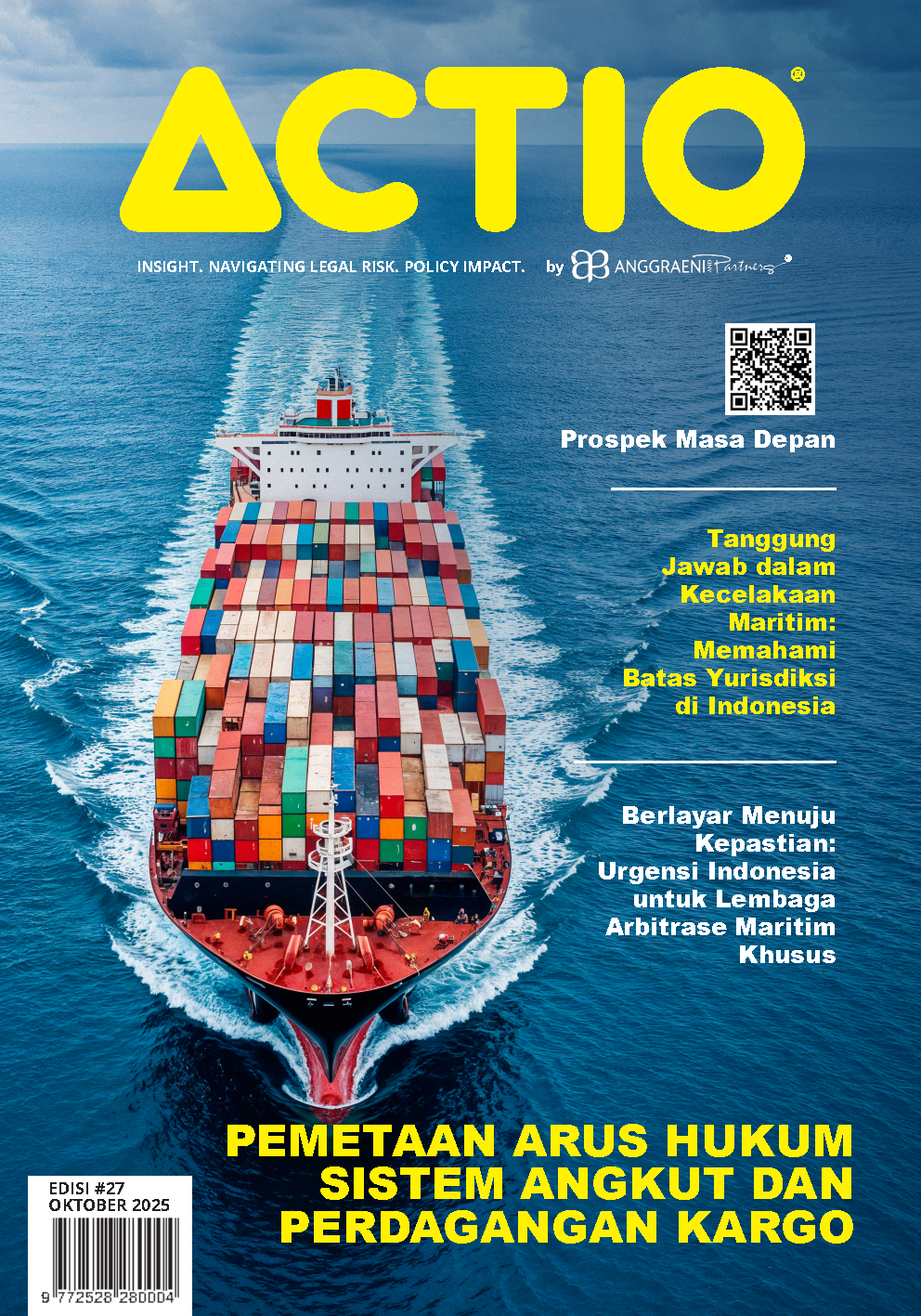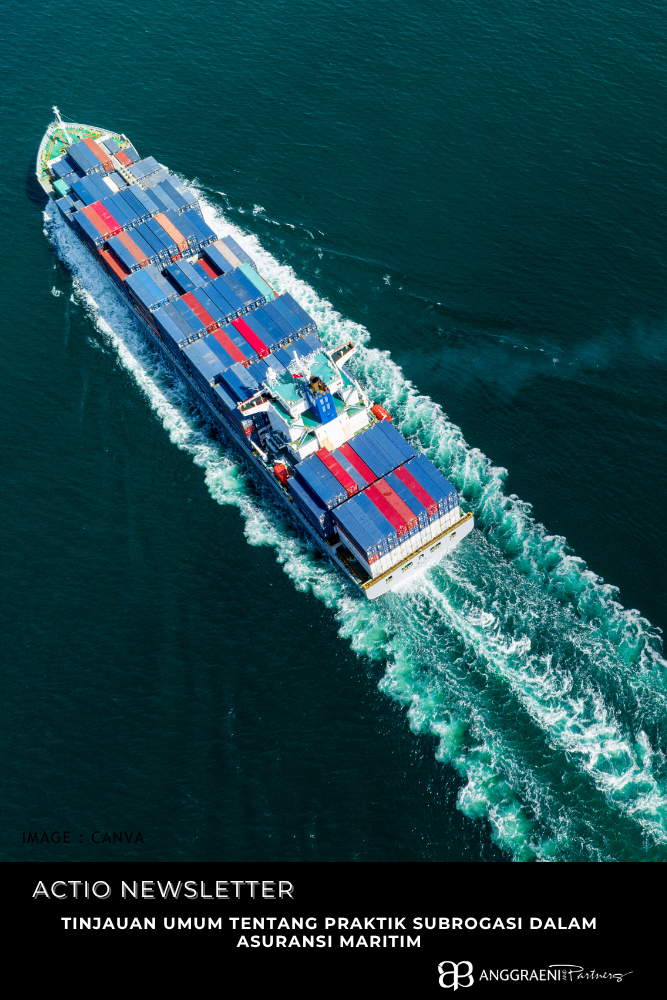Indonesia Admiralty Court’s Authority in Examining Ship Accidents
As an archipelagic country, usage of maritime transportation is essential in Indonesia, not only to carry goods but also to transport passengers. There are a lot of factors that attribute to a voyage, whether it will be a smooth sail or an unlucky accident that will create losses . It is important to carefully investigate what causes a ship accident and where to place the liability on. Relating to this, Indonesia has provided the Admiralty Court to carry out the responsibility.
The Law Number 17 Year 2008 concerning Shipping as amended by Government Regulation in Lieu of Law Number 2 Year 2022 and Law Number 66 Year 2024 (“Shipping Law”) defined Admiralty Court as a panel of experts who are under and responsible to the Minister of Transportation of Republic of Indonesia who is tasked with carrying out further investigations into ship accidents.[1] The functions of Admiralty Court are as follows:[2]
- conducting follow-up investigations into ship accidents;
- enforcing the professional code of ethics and competence of ship captains and/or crews;
- conducting investigations of operators, ship owners, and authorized officers/officials who are related to the cause of ship accidents;
- imposing administrative sanctions on ship captains, ship officers, operators, ship owners, and/or officers/officials proven to have committed errors and/or negligence that resulted in ship accidents; and
- mediating the resolution of maritime employment contract disputes.
Ship accidents are an incident suffered by a ship that can threaten the safety of the ship and/or human life, i.e., (i) sinking of a ship; (ii) a ship catching fire; (iii) ship collision; and (iv) ship running aground.[3] When a ship accident occurs, the initial investigation will be led by the harbor master first. The harbor master or syahbandar is a government official at the port who is appointed by the Minister of Transportation and has the highest authority to implement and supervise the fulfillment of statutory provisions to guarantee shipping safety and security.[4] The initial investigation result will then be handed to the Admiralty Court if there is initial information and/or preliminary evidence regarding error or negligence committed by the captain of the ship and/or ship crews.[5] The Admiralty Court holds authority to conduct this follow up investigation as stipulated by the law.[6]
In carrying the follow up investigation on the ship accident, the Admiralty Court is tasked to:[7]
- investigate the cause of the ship accident and determining whether or not there was any error or negligence in the application of maritime professional standards by the ship’s captain and/or crews in connection with the ship accident;
- investigating the cause of the ship accident and determining whether or not there was any error or negligence by the operator, ship owner, and/or authorized officers/officials that resulted in the ship accident; and
- recommending to the Minister regarding the imposition of administrative sanctions for errors or negligence committed by the ship’s captain and/or officers.
If it is found that the captain of the ship and/or crews to have been negligent or made mistake in carrying their job, the Admiralty Court may impose administrative sanctions in form of warning or temporary revocation of Seafarer’s Certificate of Proficiency.[8] Otherwise in whichthe ship operator and/or ship owner is liable, the administrative sanction imposed by Admiralty Court are warning, freezing of business permits, or revocation of business permits.[9]
References
Law Number 17 Year 2008 concerning Shipping as amended by Government Regulation in Lieu of Law Number 2 Year 2022 and Law Number 66 Year 2024
[1] Article 1 number 56 of Law Number 17 Year 2008 concerning Shipping as amended by Government Regulation in Lieu of Law Number 2 Year 2022 and Law Number 66 Year 2024 (“Shipping Law”)
[2] Article 251 of Shipping Law
[3] Article 245 of Shipping Law
[4] Article 1 number 54 of Shipping Law
[5] Article 221 and its Elucidation of Shipping Law
[6] Article 251A and Article 252 of Shipping Law
[7] Article 253 paragraph (1) of Shipping Law
[8] Article 253 paragraph (2) of Shipping Law.
[9] Article 253 paragraph (3) of Shipping Law.
DISCLAIMER :
This disclaimer applies to the publication of articles by Anggraeni and Partners. By accessing or reading any articles published by Anggraeni and Partners, you acknowledge and agree to the terms of this disclaimer:
-
During the preparation of this work, the author(s) may use AI-assisted technologies for readability. After using this tool/service, the author(s) reviewed and edited the content as needed for the purposes of the publication.
-
No Legal Advice: The articles published by Anggraeni and Partners are for informational purposes only and do not constitute legal advice. The information provided in the articles is not intended to create an attorney-client relationship between Anggraeni and Partners and the reader. The articles should not be relied upon as a substitute for seeking professional legal advice. For specific legal advice tailored to your individual circumstances, please consult a qualified attorney.
-
Accuracy and Completeness: Anggraeni and Partners strive to ensure the accuracy and completeness of the information presented in the articles. However, we do not warrant or guarantee the accuracy, currency, or completeness of the information. Laws and legal interpretations may vary, and the information in the articles may not be applicable to your jurisdiction or specific situation. Therefore, Anggraeni and Partners disclaim any liability for any errors or omissions in the articles.
-
No Endorsement: Any references or mentions of third-party organizations, products, services, or websites in the articles are for informational purposes only and do not constitute an endorsement or recommendation by Anggraeni and Partners. We do not assume responsibility for the accuracy, quality, or reliability of any third-party information or services mentioned in the articles.
-
No Liability: Anggraeni and Partners, its partners, attorneys, employees, or affiliates shall not be liable for any direct, indirect, incidental, consequential, or special damages arising out of or in connection with the use of the articles or reliance on any information contained therein. This includes but is not limited to, loss of data, loss of profits, or damages resulting from the use or inability to use the articles.
-
No Attorney-Client Relationship: Reading or accessing the articles does not establish an attorney-client relationship between Anggraeni and Partners and the reader. The information provided in the articles is general in nature and may not be applicable to your specific legal situation. Any communication with Anggraeni and Partners through the articles or any contact form on the website does not create an attorney-client relationship or establish confidentiality.
-
By accessing or reading the articles, you acknowledge that you have read, understood, and agreed to this disclaimer. If you do not agree with any part of this disclaimer, please refrain from accessing or reading the articles published by Anggraeni and Partners.
Setyawati Fitrianggraeni serves as Managing Partner at Anggraeni and Partners in Indonesia and Assistant Professor at the Faculty of Law, University of Indonesia, while pursuing her PhD at the World Maritime University in Malmö, Sweden, where she leads a legal research team focused on Ocean Maritime Climate.
For further information, please contact:
P: 6221. 7278 7678, 72795001
H: +62 811 8800 427
Anggraeni and Partners, an Indonesian law practice with a worldwide vision, provides comprehensive legal solutions using forward-thinking strategies. We help clients manage legal risk and resolve disputes on admiralty and maritime law, complicated energy and commercial issues, arbitration and litigation, tortious claims handling, and cyber tech law.
S.F. Anggraeni
Managing Partner



